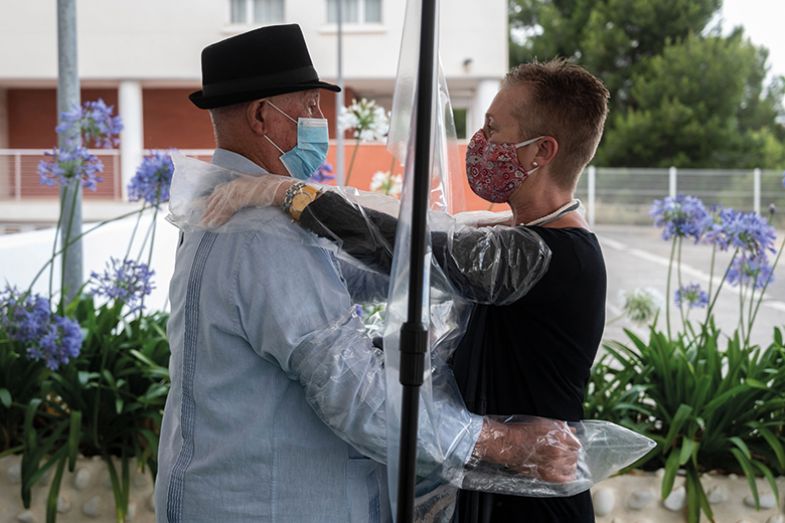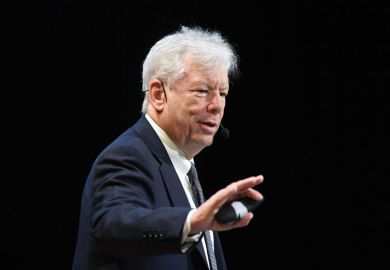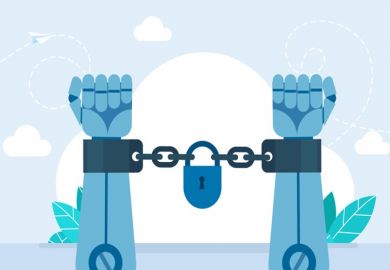Her words stay with me. “We can make a vaccine, but…”
Then she paused, with what I felt was a harrowed look of frustrated sadness and incredulity. “We cannot make people take it. That’s why we need behavioural science.”
This was just over a year ago. The speaker was not a social scientist. She was, and is, a senior US medical scientist with a biology PhD. I suspect it may have been the first time this distinguished speaker, who for a year had read repeated New York Times stories about vaccine-sceptic Americans gasping for breath, had verbalised her potential support for a scientific discipline that is not about reliable molecules but, instead, about unreliable humans.
Everyone in the editorial meeting, few of whom had any kind of social science background, seemed to give a nod or a grunt. I imagine I did too. In my head, the words of a Florida nurse came back to me. “I get that you don’t believe in science. But if you don’t believe in science, what are you doing in my hospital?”
However, what is behavioural science, and where does it stand today? Has it emerged stronger or weaker from the Covid pandemic?
As the name would imply, breadth is the essence of this hazily defined discipline. I recently opened the Web of Science and typed in “behavioural science”, in both its British and American spellings. Then I pressed the button to order the search results by citation. Near the top come myriad titles and journals: “Successful aging” from The Gerontologist in 1997; “Beyond WEIRD: Towards a broad-based behavioral science” in Behavioral and Brain Sciences from 2010; “Instrumental stake-holder theory” from the Academy of Management Review in 1995; “Using social and behavioural science to support COVID-19 pandemic response” in Nature Human Behaviour in 2020; and so on. And, so we remember one of the forefathers, there was also Herbert Simon’s 1959 essay in the American Economic Review entitled “Theories of decision-making in economics and behavioral science”.
I suppose it could be said that, narrowly defined, at least two Nobel Prizes in economics have already been given for behavioural science: to Daniel Kahneman in 2002 (“for having integrated insights from psychological research into economic science, especially concerning human judgment and decision-making under uncertainty”) and Richard Thaler in 2017 (“for his contributions to behavioural economics”). But the count would be larger if you choose a milder definition.
We might as well say that behavioural science is the study of actions, generally but not exclusively by humans, across a wide variety of settings.
Perhaps I am someone who is illustrative of an apparently ineluctable trend. I began as a somewhat conventional economist. Through the decades, it seemed best to face the fact that economics journals publish lots of articles that are not, to be honest, about economics (including on happiness, divorce, war, illness, geography, inventions, democracy, longevity, movie-going and prisons). After discussions with my employer, I broadened my job title. I would recommend that to almost anyone.
Some commentators have argued that over the difficult past two and a half years of the pandemic, when we really needed good behavioural science knowledge, UK researchers let down the country. According to Dominic Cummings, former chief adviser to Boris Johnson when he was prime minister, “charlatans” from behavioural science claimed the public would not accept being locked down. I am not sure what to make of that view, although it is crucial to pay attention to it. Cummings did not listen, as far as I know, to a line of thought about lockdowns I put to him in writing.
However, I lack knowledge of all that went on in those key Covid committees. Cummings may well have a point. Nevertheless, my instinct is that, at least in part, his is an unreasonable ex-post counsel of perfection in expecting behavioural science to have had all the right predictions about a once-in-a-century pandemic.
At this point in the Earth’s history, we simply understand molecules better than human beings, and that is partly because, as a species, we have had the good fortune that some of Earth’s most creative human beings devoted their lives to becoming Isaac Newton’s giants.
Plus, research typically lags real-life events, in part because it has to follow new avenues that are needed by human society. For example, last year in the Journal of Public Economics, Abel Brodeur and colleagues produced a fine study of how Google Trends data could be used to understand the different harmful mental-health effects of Covid lockdowns. They measured Google searches and found a significant increase in searches for loneliness, worry and sadness, while searches for stress, suicide and divorce actually fell.
This, however, is learning from previous data. I accept that, quite reasonably, Cummings wanted more, and wanted it quickly.
Health matters – and it makes a good example here. The quote with which I began suggests that part of medicine should be devoted to investigating how to help humans to behave in a way that will make them live longer and be happier. Currently, that type of knowledge is barely taught in UK medical schools, so one kind of bright future for behavioural science is to become more apparent in a range of university departments.
I expect that will happen. A quick look at academic jobs sites reveals that more and more posts are appearing with some version of those words in the job title.
Although I concentrated on sciences at high school, the idea of doing chemistry or physics at university did not seem exciting. I looked at the world in the 1970s and what gripped me was the idea of truly understanding stagflation and why miners went on strike and why there was so much keeping up with the Joneses. Today’s undergraduates have not lost that interest in what makes people tick, even as the lockdowns and days of panic buying begin to fade from memory. Humans are just so interesting.
Andrew Oswald is professor of economics and behavioural science at the University of Warwick.

In the years before Covid-19, three exercises were conducted to determine how prepared the UK was for a future pandemic: Exercise Silver Swan (2015) and Exercise Iris (2018) in Scotland, and Exercise Cygnus (a major three-day event in 2016, involving nearly 1,000 people) at a UK-wide level.
All three exercises were to do with resources and dialogues between different health and government agencies. None of them addressed the most important dialogue of all – between these agencies and the public. Cygnus at least acknowledged this absence, noting among its key lessons that public reactions to an influenza pandemic need to be better understood. The other two exercises were silent on this behavioural dimension.
It is true that they did refer indirectly to the importance of behavioural matters when they addressed issues of communication. Both Cygnus and Silver Swan addressed the need to provide clear and consistent information to the public. But in so doing they betrayed a narrow and underdeveloped conception of the issues: the need for communication to be a two-way process and for messaging to be co-created between authorities and publics, and the importance of acknowledging that the public is multiple rather than single and that engagement with different communities must take different forms.
Back before Covid, then, issues of public behaviour and of public-authority relations occupied, at best, a marginal position in the pandemic response planning, and even when they were raised, the nature of the issues was largely misunderstood.
All that changed in March 2020.
The challenge posed by Covid is that the virus thrives and spreads through the very thing that makes human existence bearable: our interactions and relations with other people. So how could we reduce contacts, keep physically apart but stay socially together (the basis for a book I wrote with colleagues from the University of Queensland on the psychology of the pandemic in May 2020, Together Apart)? How would people respond to restrictions on their interactions? The key parameter – and the key unknown – in all the modelling (accounting for the wide variation between best-case and worst-case scenarios) was the number of contacts we would have with others.
In those frenetic early days of the pandemic, the old disciplinary hierarchies seemed trivial. The advisory groups on Covid-19 met several times a week, but our ignorance was great and our understanding of the disease rapidly changing. Government was having to make decisions and so demanded answers to complex questions within days at most; we relied on each other to respond. On the one hand, we behavioural scientists relied on the virologists and epidemiologists to tell us what behaviours would inhibit or else accelerate the spread of infection. On the other hand, they and the modellers depended on us to say what might change those behaviours and what the impact of different interventions would be.
Moreover, as we began to realise that Covid-19 was not like the flu – aerosol transmission, rather than surface transmission, was critical and asymptomatic transmission was a major factor – new behavioural challenges arose. How do you get people to wear masks? How do you prompt them to act as if infected even when they feel well?
In those days, though, we still largely believed that behavioural interventions were just stop-gap measures until medicine rode in to save the day with new vaccines, drugs and treatments. This sense of hierarchy was encapsulated in the very language, in which pharmaceutical solutions were the default: behavioural measures were mere “non-pharmaceutical interventions” (NPIs).
But when the vaccines did come along, we realised that, rather than substituting for the behavioural, they simply raised a new set of behavioural challenges. How do you deal with vaccine hesitancy? What is the role of incentives and disincentives, such as vaccine passports? This recognition that behavioural science is an essential and ongoing part of the pandemic response is reflected in the World Health Organisation's decision to ditch the term NPI and refer instead to public health and social measures.
In sum, the Covid pandemic sparked a genuine transdisciplinarity, whereby the life sciences and behavioural sciences helped define the issues and priorities for the other and each acknowledged its dependence on the other. This was certainly facilitated by the fact that we spent so much time closeted in Zoom meetings with each other (far more time than with our own disciplinary colleagues) that we began to develop a sense of shared identity, to form new friendships, and to learn from and respect each other. The other day, I met in person for the first time members of an advisory group whom I must have seen more than a hundred times in the past two years in one meeting or another. It was a delight, like a long-overdue reunion of old friends.
But two notes of caution.
First, if we have discovered the central importance of behavioural science at the level of policy and societal response, this imparts a heavy responsibility as well as an opportunity. For if behavioural science matters, it can do great harm if we get it wrong, as well as do great good if we get it right.
And one of the consequences of being so unprepared on the behavioural dimension in advance is that government acted on “common sense” assumptions about how people would react, which turned out to be anything but sensible. This was encapsulated in the idea of “behavioural fatigue” – rejected by the behavioural science community as a non-scientific concept – which contributed to a delay in implementing measures to halt infection, which in turn cost several tens of thousands of lives.
We discovered that people were not so individually frail that they could not deal with the rigours of “lockdown”, but, rather, in coming together collectively they gained the strength to adhere. Resilience (or lack of it) was not a quality within individuals but a consequence of what happened between individuals as they formed communities.
Second, it is unclear whether the newfound importance of behavioural science will endure. As with so many other things we need to learn from the pandemic, such as the need to rebuild the NHS, the cost of inequalities, the dangers of social isolation and much, much more, there is a risk that this sense of the centrality of understanding behaviour to addressing crises will fade as our attention moves to new one, military or economic. Whether it does obviously depends on structural as well as ideological factors. Will sound behavioural science advice be fed directly to the decision-makers, or will it always be filtered through non-expert chief scientific and medical officers? The position of behavioural science within government clearly needs to be rethought.
The obvious place where this matters is in our response to the climate crisis. How do we get people to change their diets, their travel habits and all the other things that contribute to global warming? Perhaps even more importantly, how do we get people to come together collectively to keep up the pressure on companies, institutions and governments to change their own behaviour?
The pandemic taught us that behavioural science is crucial to saving lives. Soon, it may be crucial to saving all life on Earth.
Stephen Reicher is a psychologist at the University of St Andrews and vice-president for arts, humanities and social sciences at the Royal Society of Edinburgh. He has been an adviser to both the UK and Scottish governments on Covid-19 and convenor of the Behavioural Science group of the independent advisory group Independent SAGE.
Register to continue
Why register?
- Registration is free and only takes a moment
- Once registered, you can read 3 articles a month
- Sign up for our newsletter
Subscribe
Or subscribe for unlimited access to:
- Unlimited access to news, views, insights & reviews
- Digital editions
- Digital access to THE’s university and college rankings analysis
Already registered or a current subscriber?






